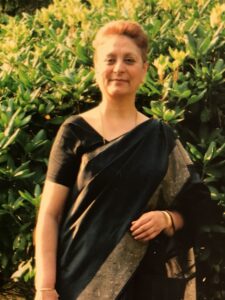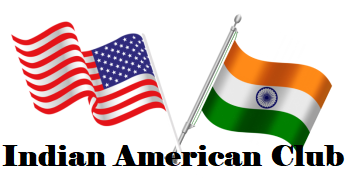 Kamlu Gulrajani is a retired information technology specialist, who worked as a bank officer in India before immigrating to the United States in the early 1980s. During her career and continuing to the present, Kamlu has been involved in initiatives and organizations focusing on community service, health and wellness, and cultural awareness and heritage in Central New Jersey.
Kamlu Gulrajani is a retired information technology specialist, who worked as a bank officer in India before immigrating to the United States in the early 1980s. During her career and continuing to the present, Kamlu has been involved in initiatives and organizations focusing on community service, health and wellness, and cultural awareness and heritage in Central New Jersey.
Kamlu was born in December 1946 in Karachi, in what was then India and is now Pakistan. Her father, Vishindas Gulrajani, and her mother, Devibai Gulrajani, Devi for short, came from the same area of Hyderabad-Sindh. Both Sindhi Hindus from the Amil sub-caste, they had an arranged marriage in 1942. Kamlu’s brother Ramesh was born in 1943. During that time, her father served in the British Army as a customs enforcement official.
Under the dowry system, Devi faced exploitation and abuse from her in-laws and husband. Devi’s mother, JethBai Hiranandani, who had passed away, was the second wife a rich landowner and had passed down her estate to her two daughters, with her daughter Ruki’s husband Santdas Mirchandani being the executor of the will. At the time of their marriage, Vishindas, whose father passed away, had four sisters who were unmarried. Vishindas received a very large dowry upon his marriage to Devi. “What happened was, as soon as my mother got married, the very next day, my father’s sister, Tikki, got married, so they used my mother’s dowry to pay for his sister’s dowry to get married,” explains Kamlu about the situation. “Then, they thought that [they could put] more pressure on my mother to get more money because now they used up her money and now they want more money, so then that’s when all this trouble started. They kept harassing her and beating her, and she had a miserable time. She suffered a lot.”
After several years of abuse and with two young children to care for, Devi left Vishindas, only to continue to endure the stigma of being separated from her husband. Devi, Ramesh and Kamlu lived in the Kurla widows camp, where widows were banished to live after their husbands died. Kamlu compares this to the Sati system; when a husband died, the wife was burned alive on his funeral pyre. Although Sati was outlawed, Kamlu explains, “If you are a widow, that is, if your husband died, then you cannot live in that same community, like you’re ostracized, because you cannot remarry. That was their culture. A widow is not allowed to remarry at that time. Her life is over.” Kamlu explains about societal views on divorce at the time, “It is frowned upon. People prefer to suffer in silence and it’s like an insult or degrading for any woman to be divorced, because they find fault, like maybe something is wrong with the woman, that’s why she’s divorced.” Many years later, Kamlu’s parents officially divorced, when her father wanted to get remarried.
The partition of India and Pakistan took place when Kamlu was an infant in August 1947. At that point, Devi, with Ramesh and Kamlu, boarded a train for Ahmedabad, India, where Santdas’ brother Udharam Mirchandani served as the Commissioner of Bombay State. He welcomed the family to his bungalow, the very same bungalow in which the ashes of Mahatma Gandhi were displayed for public viewing after his assassination on January 30, 1948.
Kamlu reflects that prior to the partition her family experienced good relations with their Muslim neighbors. Hindus and Muslims would share fruits and vegetables from their harvest. Kamlu states, “We never felt that they are separate from us all or they are following a different religion. There was no hatred, no nothing.” Appreciation for religious and cultural diversity was ingrained in Kamlu during her upbringing and has left an indelible mark on her beliefs and outlook.
The hardships faced by Devi and the obstacles that the family were forced to overcome proved to be formative experiences for Kamlu. In 1950, through the help of the charitable organization Bhai Bhagwandas Trust, Devi, Ramesh and Kamlu moved to Bandra in Bombay, now Mumbai, where their situation vastly improved. Many of their neighbors were also Sindhi Hindu refugees, and the community was close-knit. She remembers the Satyanarayan Puja prayer service, observed on the day of a full moon, in which the neighbors would break fast together with a feast of a vegetarian meal and fruit and nuts.
Kamlu and her brother attended English parochial schools. They received support from neighbors when they needed extra help in their studies. Kamlu also benefitted from the tutoring of her older brother, which paved the way for her academic success in school. Additionally, the family received support from K.T. Shahani Trust and Gidwani Trust Families.
In 1958, the family moved to a larger home in Bandra. Kamlu continued to enjoy the rich cultural and religious practices of her community. She spoke Hindi, Marathi, the local language, Sindhi, her mother tongue, which was spoken at home, and English, the medium used at school. At this point, more than ten years after the partition, Kamlu says that they were cordial with their Muslim neighbors but did not congregate with them. “Muslims did not visit the Hindus, Hindus did not visit the Muslims. They never quarreled or anything. They lived in peace and harmony,” she describes. She has fond recollections of celebrating various state holidays and Hindu festivals, including Republic Day, Teejri, Diwali, Dussehra and Cheti Chand. Kamlu explains, “Different parts of the country, they have different ways of celebrating. It used to be very interesting to interact with them and have exchange of ideas and gifts and culture. We lived in harmony, basically in harmony, even though we did not understand some people’s language because it was very difficult, but just smile and be able to manage.”
Kamlu attended Sydenham College of Commerce and Economics, Churchgate, where she studied commerce, banking and finance. After graduating in 1969, she got a job at Indian Overseas Bank. She became a Certified Associate of the Indian Institute of Bankers and worked as an officer at Indian Overseas Bank.
Following their father, Ramesh immigrated to the U.S. in 1979 and settled in Queens, and Kamlu came in 1981. Their mother followed in 1984. As was the case during their childhood, Ramesh and Kamlu received very little support from their father, aside from his sponsorship, once they settled in the United States.
First living in Brighton Beach, Kamlu acclimated to life in the U.S. She jokes about everything being supersized and, raised on Hollywood depictions of America, reacted with surprise to the rundown sections of New York City. She struggled to find work, with no American job experience and no computer training. Additionally, she thinks that because she was so highly educated in India that American companies were reluctant to hire her for entry-level positions because they did not want to spend the effort on training her for a job that would be temporary.
“Tough times do not last, but tough people do!” has been Kamlu’s mantra, as she has persevered to overcome obstacles. She continued her education, shifting to information technology. She received a diploma in technology from New York University in 1986 and a certificate in computer programming from Cittone Institute in 1995. She recounts, “I did work in very big Fortune 500 companies, like AIG, Citigroup, TIAA-CREF, all Fortune 500 companies I have worked in, and Somerset Medical Center also, in the computer department.” Overall, she enjoyed the corporate culture in America. In 2001, she won a leadership award from CitiStreet, a subset of Citigroup. She did, however, encounter gender-based discrimination in a job. After involving an employment discrimination lawyer, the situation improved. She was laid off during the financial crisis of 2008 and then decided on early retirement.
Over the course of her life, Kamlu has learned, “The compassionate way of treating human beings is much more important.” In the mid-1980s, she moved to East Brunswick, where her brother had settled. Once in New Jersey, she first became involved in community service through a local network of friends and associates at the Sathya Sai Baba Organization. Her civic involvement has continued to the present. She is a Bal Vikas Teacher for Sathya Sai. She teaches English for the Literacy Volunteers of Middlesex County. She volunteers at the soup kitchen in New Brunswick, Elijah’s Promise, and in other local efforts, such as collecting and donating gifts during holiday seasons. She is actively involved in the East Brunswick Public Library and the East Brunswick Senior Center, where she moderates classes, attends discussion groups, and writes letters for a pen pal program with local students. She participates in the Indian American Club of Rossmoor in Monroe Township and in health and wellness initiatives at the YMCA. She is also a volunteer member of the East Brunswick Water Policy Advisory Committee.
Over the years, Kamlu has connected with other South Asian community members and with Sindhi Hindus in particular through going to temple, most recently attending the Sadhu Vaswani Center of Central New Jersey. She serves as an officer at Agraj Seva Kendra, an Indian cultural organization in Middlesex County. She notes of her activities, “Agraj Seva Kendra partners with various dance schools and brings art to the community. Last year, we conducted Heritage Day, partnering with guru Malini Nair, under the artistic director of Sowparnika Dance Academy. In 2020, due to COVID, the event was virtual by the same school, Sowparnika Dance Academy. My speech was recorded, along with Govinda Rajan and Shanta Bhatia during the event.”
A student of Brahma Kumaris, a world spiritual organization, she leads meditation and mindfulness sessions. Through Brahma Kumaris, she has developed a newfound respect for all humans. “They have a lot of knowledge to give you and explain to you,” Kamlu describes, “that you are not the body, you are the soul. That interests me a lot. Philosophy and all that is very interesting to me, and I keep in mind that I should not be distracted [by] an outside appearance of a person or what color or shape, size, no. When I talk to people, I know that this is just a costume and that I’m talking to the point of light. This way, I don’t have any prejudices because I am grounded.”
Despite the pandemic, Kamlu has continued her own personal and spiritual development. Even though she suffers from macular degeneration in one eye, she asserts, “That doesn’t stop me from being able to provide whatever help I can give in any other way. ” Initially impacted by the pandemic shutdown of the spring of 2020, Kamlu quickly adapted. She continued her education through online courses, learning spoken Sanskrit. She met many of her neighbors, who now were working from home, and relied on community services, such as the Blue Delivery Program, in which the police delivered groceries to residents. Kamlu attends daily meditation sessions via Zoom and has continued her involvement in cultural and philanthropic organizations. Kamlu explains, “I have a good support system. You have to do the best you can, because change is the only thing that’s going to happen all the time. Nothing is permanent except change. So, you have to accept it, this is what it is.”

